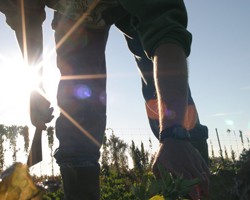Collaborative Marketing for Small Farms

Collaborative marketing is a realistic solution for small- to mid-size farms that are seeking access to larger markets, but are unable to individually serve such accounts. In collaborative marketing, several like-minded producers join together formally to market and distribute farm products, but not necessarily under the governance or control of a cooperative.
The range of farm products that can be sold through a collaborative group is as diverse as the farms themselves: meats, vegetables, forest products, fruits, grains, flowers, nursery & greenhouse products, cheeses and other dairy products, and livestock.
Collaborative marketing may influence many areas of your farm. By choosing to market jointly with other farms, you will adjust your planting intentions, harvesting and storage techniques, crop schedule, certifications, buyer relationships and many other farm office decisions. It is not a decision to be taken lightly. In fact, establishing some type of business collaboration may be one of the more complicated decisions you will make for your farm.
The financial bottom line for family farms is profitability. Collaborative marketing could reduce your marketing expenses, but it might not make your farm profitable overall. Fortunately, there are ways for you to collaborate with other farms for trial periods to assess the economic strengths or weaknesses. The opportunities opened up through multi-farm marketing need to be tempered with good agreements and procedures.
Generally, small farms should consider temporary, limited-scale collaborative projects before developing substantial business agreements. Such arrangements can be a simple as consignment sales, or as complex as a corporation dedicated to marketing and distribution.
The PDF below contains information on creating a collaborative marketing strategy: considering the different types of collaborative marketing business structures, seeking attorney assistance to develop a collaborative marketing agreement, managing commmon problems, and a handy worksheet to help you organize the basic aspects of a collaborative marketing agreement.
Collaborative Marketing for Small Farms: Selling & Working Together (pdf; 447KB)

Upcoming Events
Wine Sensory Evaluation Workshop
April 26, 2024 : Wine Sensory Evaluation Workshop
Staatsburg, NY
In collaboration with Jeremy Schuster, Viticulture Specialist at the ENYCHP, Dr. Anna Katharine Mansfield and Chris Gerling, Enology Extension Specialists with the Cornell Craft Beverage Institute, will be presenting a wine production-focused, interactive workshop on sensory evaluation.
What is my vine trying to tell me?
May 15, 2024 : What is my vine trying to tell me?
Plattsburgh, NY
Are your grapevines showing signs of discoloration or stunted growth? Don't ignore these warning signs! Join us on May 15th at the Cliton County CCE office to learn about the essential nutrients that grapevines require to thrive, identify the symptoms of nutrient deficiencies, and how to fix them. Don't miss out on this opportunity to improve your grapevine cultivation skills! Attendance is free, but registration is required.
How man's best friend can help find Spotted Lanternfly
May 21, 2024
Millbrook, NY
Come and join us at the Dutchess County CCE office on May 21st for a special demonstration by Jennifer Fimbel, the Agriculture and Horticulture Program Leader with Dutchess County CCE. You will get to see her SLF K9 Cole in action as they demonstrate how man's best friend can be used to detect the Spotted Lanternfly. Attendance is free, but registration is required












































